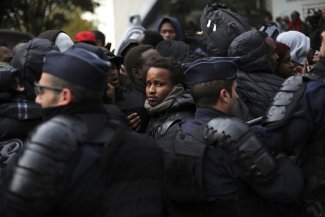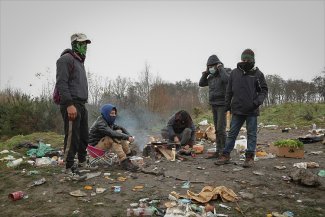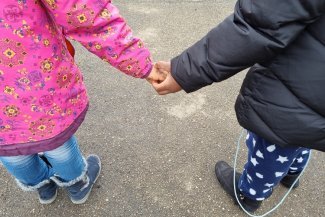
Cédric Herrou, in 2016, in the market of his home village of Breil-sur-Roya.
When he bought an isolated farm in the mountains north of Nice to grow olive trees and breed poultry, just a few kilometres from the Italian border, Cédric Herrou was seeking a quiet life as a solitary, peasant farmer. But then he witnessed first-hand the difficulties experienced by undocumented migrants who try to cross into France through his small, landlocked valley. Since 2016 and together with other volunteers, he has helped men, women and families pursued by the police in the area around his home. He provides accommodation to hundreds of them and arranges transportation that steers clear of police roadblocks so that they can file their asylum applications in safety.
Herrou has been targeted by the French state for his activities and has faced several legal proceedings as well as harassment from the police, who have arrested him several times and put his farm under surveillance. But the 42-year-old Frenchman, who defines himself as a simple “peasant” and citizen, has stood his ground, defending the rights of migrants in court and the media. Time and again, he has denounced the French government’s failure to fulfil its legal obligations – to provide asylum, to help people in danger, to protect minors, etc. In March 2017, the French government was condemned for gravely infringing the right to asylum. In July 2018 and after a long legal battle, the Constitutional Council introduced a new, legal “principle of fraternity”, considering that it was possible to help a foreigner with a ‘humanitarian aim’ without asking for that person’s papers. It also reduced the charges against Herrou to a ‘crime of solidarity’.
A year later, while the flow of migrants from Italy was decreasing, others remained in the valley. To develop a longer-term approach, together with Marion Gachet Dieuzeide, Herrou created an Emmaüs community, a companionship movement for integration. Several Emmaüs communities already exist in France, but they are mainly focused on the recycling and reselling of used items. Gachet Dieuzeide and Herrou founded the first agricultural project in the history of the Emmaüs movement in his village of Breil-sur-Roya.
In October 2020, Herrou published a book that tells the story of how he became involved in all this, Change ton monde (Change your world), published by Les liens qui libèrent. Equal Times met him in Brussels, in April 2022, during a meeting with Belgian NGOs.
You have witnessed police interactions with migrants in your valley several times. Which of the events that you have witnessed shocked you the most?
There have been so many events. It’s the accumulation of shocking events in fact; it’s the mistreatment as a whole. The problem arises when the préfet, the representative of the state, gives orders that are completely illegal. One day, while I was in police custody, there were about 40 kids waiting to be taken into care by the child protection agency. This is France’s duty when it comes to minors, and the person legally responsible in this case is the public prosecutor in the absence of the parents. However, the kids were sent to Italy to be released there...completely illegally!
When the state doesn’t care about the law and doesn’t respect the law itself, we are filled with indignation not just at this state racism, but also at the fact that the state does not respect its obligations. I am told to respect the law, yet our representatives do not respect it. This is when we see that we are stretching the boundaries of democracy.
In 2022, what values or rights do you think are most at risk in France in the current climate?
It is democracy itself. Democracy is in total decline in France. I see that above all, before the other values, because democracy covers all the other concepts: liberty, fraternity, etc.
You started helping migrants almost single-handedly. Little by little, people supported you and joined you. Today, you have created a farming ‘community’. What have you learned over the years about the power of the collective?
It’s true that at the beginning I was a bit on my own, but then I was helped by a young activist, Lucile. Because there needed to be a woman in the house to also reassure the migrant women and girls, who had often been raped or abused on their journey. She left at one point and then other volunteers took over, for example, Marion [Gachet]. What is also interesting is that the migrants who stopped at my place spontaneously took on roles – some did the cooking, others were in charge of the night reception, the day reception and use of the washing machine. And afterwards, when the person decided to leave, they would find someone who could take over and train them.
I learned humility and intelligence, because sometimes – and this is something we need to admit – we are not intelligent enough to have an opinion on complex subjects on our own; and when there are several of us, we become a little smarter. You have to know how to listen and that’s what we learn the most from our interactions with others.
Otherwise, during my legal battle, with my supporters, we collectively managed to get the law I was charged with breaking changed – that’s quite something! With the help of lawyers, community activists, artists. We used a lot of tools, from a young woman who wrote a sociology thesis, to a film [editor’s note: ‘Libre’ (Free) by Michel Toesca], we used the broadest possible tools to do this. It could be something festive; it could be conferences, writing, cinema, education. Everyone did what they knew best. The nurses provided care, the lawyers gave legal advice, the filmmakers made films, and everyone took ownership of this struggle.
And you, what did you know best?
I know how to be crazy and not be afraid, maybe?
In fact, it wasn’t necessarily me; it was more so my place. It wasn’t so much me, as an individual, that served as the catalyst, but the space itself. In fact, it’s really about private property, a place that the police can’t enter that easily. That’s maybe the big difference with Calais; it’s the story of private property. When you think about it, it’s crazy. Property rights are more respected than individual rights. You can flout the right of asylum, but you don’t enter a private space.
In your struggle, you have had a lot of dealings with the French legal system. What is your opinion of it? Is it being misused, or does it still have the power to enforce the fundamental rights enshrined in the French constitution and international treaties?
Justice has the power to enforce fundamental rights. I cannot judge the justice system solely on my case, because it was a political case. The public prosecutor’s office used the judicial system to make a political point, to show that the French government’s intention was to use my case to demonstrate that migration was dangerous; that migrants were dangerous. They made migrants ‘toxic’ and sought to pass on the message: “If you go near a migrant, if you help them; you go to prison”.
The legal system is like everywhere else. There are good people and people who are manipulated. I think that, overall, it’s OK in France. In fact, worse things are happening elsewhere. We won in the end; we made the law evolve – that’s positive.
Distant conflicts have arrived in your own garden in a remote Alpine valley. Isn’t this proof that they are not so far away and that Europeans should be more insistent in demanding that their politicians be held accountable for their actions on the international stage?
We are partly responsible for migration (admittedly not all migration of course), notably through the sale of arms. France is one of the main arms sellers in the world. I find it completely absurd; we sell to leaders who then mistreat their populations. We sold arms to Putin just two years ago!
And on the other hand, we have trade treaties that impoverish and deprive certain countries. With the CAP [European Union’s Common Agricultural Policy], for example, French chickens are sold in Senegal for less than €2.50. The Senegalese can’t compete with chicken from France. We crush foreign producers with our export subsidies. We take advantage; we strip countries of their precious minerals in exchange for a motorway, a railway station and three street lights. Migration is the result of our capitalist policies, which intensify inequalities and decimate the sharing of our global wealth. There can be no solution until we overhaul our economic system. But I fear that we are very much in the minority in agreeing to pay the right price for our purchases so that the workers who produce the goods imported into Europe can earn a fair wage.
Before all this, I didn’t know where Eritrea was. I’m often presented as a pro-migrant activist, but it’s not really that. It’s just that there’s a problem down the road from me, a humanitarian problem, an abuse. I often say that if it had for instance been the left-handed people who were being mistreated, I would be helping the left-handed people. I am not fighting for a specific goal, but to live in accordance with my beliefs. I don’t have an ideal of a future life; what counts is ‘now’.
Can you tell us more about your current project, the Emmaüs Roya community? How did it come about and why?
A lot of people have come to me and some have stayed at my place. It’s not always easy for them. They sometimes fall into depression, go through a post-traumatic crisis linked to their migration, they miss their families. I was surrounded by the police at the time and I’m a farmer, I couldn’t say “yes” to the young people who felt bored and wanted to help me with the farm work. It wasn’t possible because the police were there, watching us. I didn’t want to be accused of under-the-table work. So, we said to ourselves that we had to set up an association to give these young people an occupation and get away from the charity aspect. Because there’s nothing worse for destroying someone than doing charity. You can really mentally help someone by allowing them to participate in their own well-being.
We then became interested in how the Emmaüs companion system works, which normally focuses on recycling. We went to see them to tell them that we wanted to do the same thing, but differently, through farming and as part of the movement. The status of Community and Solidarity Activity Host (in French, Organisme d’Accueil Communautaire et d’Activité Solidaire, OACAS) allows the 120 Emmaüs communities to declare people, even if they are undocumented because they provide ‘unconditional’ reception. This means that the work can be declared to the URSSAF social protection agency, that social security contributions can be paid and the whole undertaking is legal. We are not talking about work; we are talking about ‘activity’. The community is self-financed without state subsidies; we live from our work. The companions are housed and fed by the association, have access to showering facilities and participate in the life of the association. We started in July 2019 by buying a 500m² building, with 200m² of living space, where we now house 13 people, including four children and nine adults.
The Emmaüs communities, conceived by Abbé Pierre, are still a revolutionary movement. And even if we become Emmaüs, I would say that doesn’t mean that we are going to remain quiet in the face of injustice.












